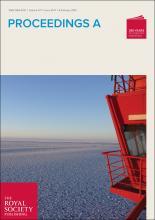What do you think?
Rate this book


18 pages, ebook
Published February 8, 2015
In constructor theory, when the laws of physics say that no constructor can perform a given task to arbitrarily high accuracy, that task is impossible. For example, the task of lifting [an object] is impossible without supplying any energy. However, what is possible is the task of lifting [an object] and depleting a battery appropriately charged. The battery cannot be part of the constructor, because it gets depleted during the process. Otherwise, the task is possible – which means that it can be performed in reality to arbitrarily high accuracy and reliability but need not happen.